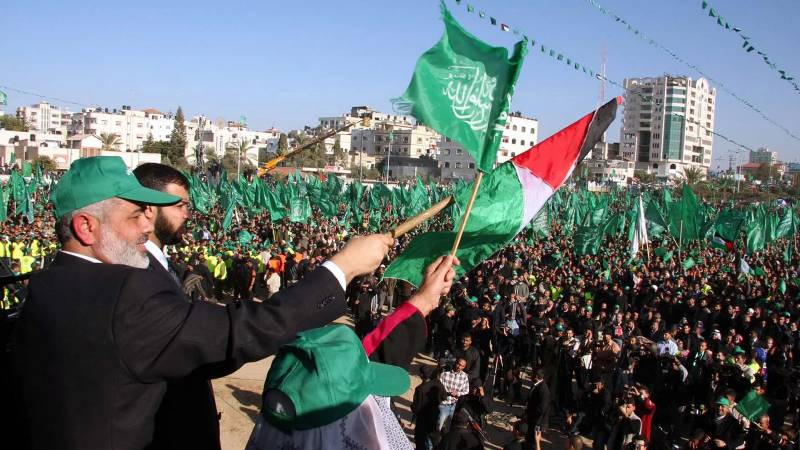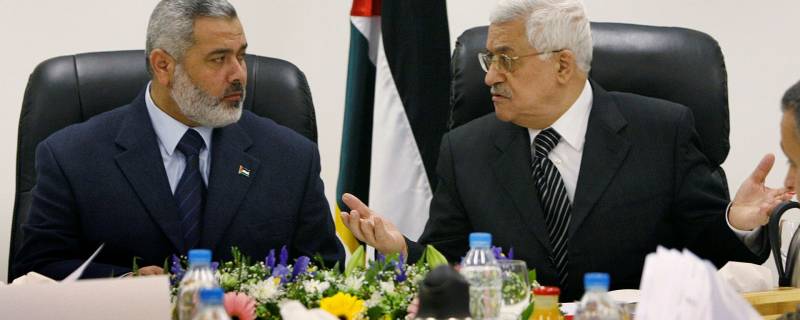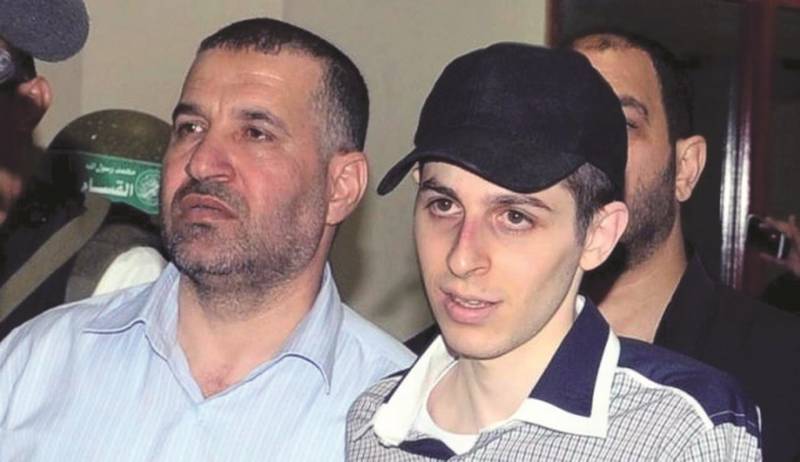Hamas vs al-Qaeda – a battle for souls

Ismail Haniyeh with his supporters
Hamas between two fires
After Hamas’s victory in the 2006 elections, its relations with the PLO continued to remain tense, sometimes turning into armed confrontation, as we discussed in the previous article.
They fared no better with Israel. And eventually they reached a boiling point, which resulted in the IDF’s “Cast Lead” operation in December 2008. Tel Aviv called rocket attacks on Israeli territory its main reason; I emphasize - I just named it. The real motive for the operation could lie on a different plane: for example, in the deliberate discrediting of both the leaders of the movement that won the elections and it as a whole. However, this is from the category of assumptions.
But the key question here is: who exactly fired? Israel, of course, blamed Hamas. However, it is not so much he who is to blame for the aggravation of the situation as al-Qaeda, banned in Russia, and the groups influenced by its ideology, one of which was called “Jihad Regiments in the Territory of Confrontation with Infidels.” In fact, the mentioned operation was provoked by her shelling.
In Tel Aviv, they did not pay special attention to the difficult ups and downs of the internal relations of various paramilitary structures in the Gaza Strip, probably believing that since Hamas won the elections and claims to be the status of a legitimized force in the Palestinian Authority, then it should be responsible. For everyone.
But the focus of our attention is not so much the confrontation between Israel and Hamas, but the struggle (of course, its intensity and, if you like, sincerity and consistency: another question) of the latter with destructive forces hostile to the movement inside the Gaza Strip. And then there was the added sabotage after the elections by Fatah of the transfer of the Palestinian Authority security service to Hamas control.
But still, if Hamas leader I. Haniyeh could still negotiate with Fatah leader M. Abbas, in the end, the former officially entrusted the head of the movement with the formation National Unity Governments (it did not last long, however) - then an open dialogue with terrorists was and remains impossible for him without turning into a handshake and marginal politician in the eyes, first of all, of Russia.

I. Haniya and M. Abbas
Namely, in Moscow, at the invitation of V.V. Putin, the Hamas delegation, led by the second person in the movement, H. Mashaal, made its first foreign visit, during which a meeting was held with Patriarch Alexy II. The latter is important, because in the previous material we noted the participation of Christians in the movement.
The support of the Kremlin, for obvious reasons, was extremely important for Hamas, especially in the situation that it had previously assumed responsibility for the activities of other paramilitary groups in the Gaza Strip, control over which was more than difficult.
Yes, I see a possible question: “Isn’t Hamas terrorists?” I proceed from the fact that the movement in the Russian Federation is not recognized as a terrorist organization, just as the material itself testifies to the movement’s opposition to truly destructive forces.
Hamas against al-Qaeda and ISIS
W. bin Laden, in turn, showed increased attention to the Gaza Strip and the West Bank of Jordan, calling, according to Arab historian A.V. Demchenko, the Palestinian problem as the main one after the terrorist attacks of September 11, 2001.
In addition, al-Qaeda directly, that is, through the heads of the Hamas leadership, appealed to the residents of Gaza with a call to take part in the global jihad against the Israelis and the Crusaders, that is, in essence, it demanded open disobedience to the leadership of the movement.
An important detail: after the liquidation of W. bin Laden, A. Az-Zawahiri, who became his successor, concentrated the efforts of terrorists on the Arab world itself and, above all, on Egypt, Sudan, the Maghreb countries, as well as the non-Arab part of the Muslim ecumene in the person of Somalia (by the way, Sudanese can also be called Arabs with a certain amount of stretch).
Accordingly, between these states and terrorist groups based in Syria, Iraq and Afghanistan, Palestine became a kind of connecting link and hub through which the circulation of financial flows, weapons and recruits to extremist organizations could be carried out, and at the same time rocket attacks on Israel and terrorist raids on its territory. And Hamas had to pay the price as a legal (albeit in the eyes of not all states) military-political structure in the Gaza Strip.
In general, according to the oriental historian D. A. Nechitailo, the network of al-Qaeda groups operated in more than 60 countries during the period we are considering. Impressive, you will agree. Considering the obvious response of fanatics to A. Al-Zawahiri’s call to go to the Holy Land to wage jihad with the “infidels”, and at the same time undermine the positions of Hamas in the Gaza Strip.
For his negative attitude towards the idea of global jihad caused concern among Al-Qaeda, especially given the fact that in June 2008 the movement not only agreed to a six-month truce with Tel Aviv, but also proposed to the Israeli leadership to conclude it for ten years .
One of the reasons for this step, I think, was named by researchers E. Milton and S. Farrell:
However, pro-Alkaid forces in Palestine did not sit idly by. So, in 2005
At that time, the Palestinian Authority was literally flooded with various terrorist groups, which were involved, among other things, in kidnapping foreigners - mainly Americans and British. Thus, in March 2007, a certain Salafi “Army of Islam” kidnapped BBC correspondent A. Johnston. And do you know how they managed to free him? Hamas security sealed off the building where the hostage was being held.
Later, the forces of the movement even had to clear the southwestern quarter of Gaza, where the Dogmush criminal clan, which controlled the Army of Islam, was based. However, the situation for I. Haniya was complicated by the increasing penetration of terrorists into the autonomy.
Wherever they came from.
Please note: almost all of these regions have long been engulfed in war, and the young people who came from there, for the most part, probably knew how to handle weapons and had at least basic tactical training experience. And there is no need to talk about their brainwashing by various kinds of preachers.
And all of them, almost unanimously, did not hide their disappointment with Hamas’ transition to legal activities and its participation in the parliamentary elections, and the movement’s six-month truce with Israel generally acted on the terrorists like a red rag on a bull.
Hamas itself, according to the historian G. G. Kosach, did not consider itself a purely religious organization, but acted as a structure striving to acquire a national character. Al-Qaeda and ISIS, on the contrary, position themselves as supranational groups.
Unfortunately, some Hamas activists, carried away by jihadist propaganda, joined their ranks. There is also reason to believe that A. Jabari, who headed the paramilitary wing of the movement - the Izz ad-Din al-Qassam brigade, was playing his game. True, he was hardly fascinated by propaganda, but rather by the prospects of seizing power – albeit unofficially – in Hamas by relying on terrorists.
The situation for I. Haniyeh and his supporters was aggravated, following the Army of Islam, by the emergence in the Gaza Strip of another influential paramilitary structure - the Army of the Supporters of Allah, which sought XNUMX% control of the Palestinian enclave.
(quoted from: Demchenko A.V. Op. cit.)
Hamas did not stand on ceremony with the terrorists and stormed the mosque. The imam died.
An important nuance: the sermon was delivered in a mosque named after Ibn Taymiyya, the theologian and founder of Salafism who lived in the XNUMXth century. It was his works that W. bin Laden often quoted.
And the interpretation (I emphasize: not a statement, but an interpretation) of the theological views of Ibn Taymiyya was determined by the fatwa adopted by several terrorist leaders in 1998, calling, as the Arab historian A. I. Matochkina notes, to kill Americans, and not only military personnel, but also civilians. The basis for the fatwa was the words of Ibn Taymiyya that there is nothing more sacred than faith, with the exception of repelling the enemy who threatens religion and life.
However, in fairness, we note the point of view of a number of Islamic scholars who believe that terrorist leaders distorted the teachings of Ibn Taymiyyah.
What is important for us is the following: what the PLO and Fatah were recently reproached for, which we talked about in the last article, terrorists began to blame Hamas for the same thing.
Another headache for the Hamas leadership after winning the elections was ISIS, banned in Russia, which, according to D. A. Nechitailo, focused its efforts on fighting
Here, however, I. Haniyeh and his supporters played into the hands of ISIS’s profiting from a long list of enemies, which included the Shiite Hezbollah and the Yazidi Kurds, and even one operating in Syria and also, if I’m not mistaken, recognized as terrorist in Russia "Jabhat Fatah al-Sham".
And, nevertheless, according to the data provided by D. A. Nechitailo, about 20 terrorist organizations around the world have sworn allegiance to the main ISIS leader al-Baghdadi.
However, like many organizations of this kind, ISIS did not escape the internal conflict among terrorist leaders, which flared up in Iraq, which is relatively close to Palestine (after 2003, unfortunately, this name should be given a geographical rather than a political meaning).
In that year, the jihadist groups operating there united around A. al-Zarqawi, a Jordanian who fought in Afghanistan in the early 1990s. The idea of global jihad somehow did not particularly warm him, but the confrontation with the Shiites was seen as the main task. Although he nominally submitted to W. bin Laden and even simply called his group “Al-Qaeda in Iraq.” However, instead of global jihad, that is, terrorist activities around the world, he focused on the massacre of Shiites.
Another important point: in the previous material we talked about the transition of a considerable part of Saddam’s former officers to the camp of terrorists. This was largely due to the terror unleashed by the nominal head of Iraq, N. al-Maliki, against the Baath, whose ranks included many military personnel until 2003. Rumor has it that even al-Baghdadi was an officer in the Iraqi army, but there is no exact information on this matter. And yes, since Saddam was remembered. Just for reference: Hamas condemned the Iraqi invasion of Kuwait, but the PLO, on the contrary, supported it.
In general, ISIS, due to the short-sighted policy of the American puppet, quickly received qualified cadres of lower and middle-level commanders, of which Hamas experienced a significant shortage. And the possibility of terrorist leaders using these yesterday's Iraqi officers in the Gaza Strip posed a significant threat to I. Haniyeh and his supporters.
Ahmed Jabari and Corporal Shalit: a secret that will not be revealed?
In conclusion: beyond the scope of our story there is a resonant story with the abduction and five-year (2006-2011) detention of Corporal G. Shalit, without which the picture associated with the political image of Hamas does not look complete. However, comprehensive information about it could be provided by the above-mentioned organizer of the kidnapping and, in fact, the one who held Corporal A. Jabari, who was liquidated by the Israelis in 2012 - a year after the release of G. Shalit.

A. Jabari and G. Shalit
Along with him, information about his connections with terrorist groups, the security service and even the political circles of Israel went to the grave. That is why A. Jabari’s difficult relationship with the leadership of Hamas, to which he formally had to submit (however, it is not a fact that this happened in practice), we are forced to leave out of the equation due to lack of information.
The only thing is that journalist N. Lebedev directly wrote in one of the Israeli publications:
In the next article we will talk about the relationship between Hamas and Hezbollah. For both on the Internet and in the media there are many questions on the subject: why the Shiite Hezbollah is now in no hurry to open a second front in the north, thereby providing significant support to the Sunnis.
Использованная литература:
*Demchenko A.V. Jihadist organizations supporting al-Qaeda: new players in Palestine
*Lewis B. Islam: What Went Wrong
*Matochkina A.I. Appeal to the ideas of Ibn Taymiyya in modern and contemporary times
*Milton E.B. Farrell S. Hamas: Islamic Resistance Movement
*Lebedev N. “Cornet” for schoolchildren
*Nechitailo D.A. “Al-Qaeda” and “Islamic State” – general and special
Information